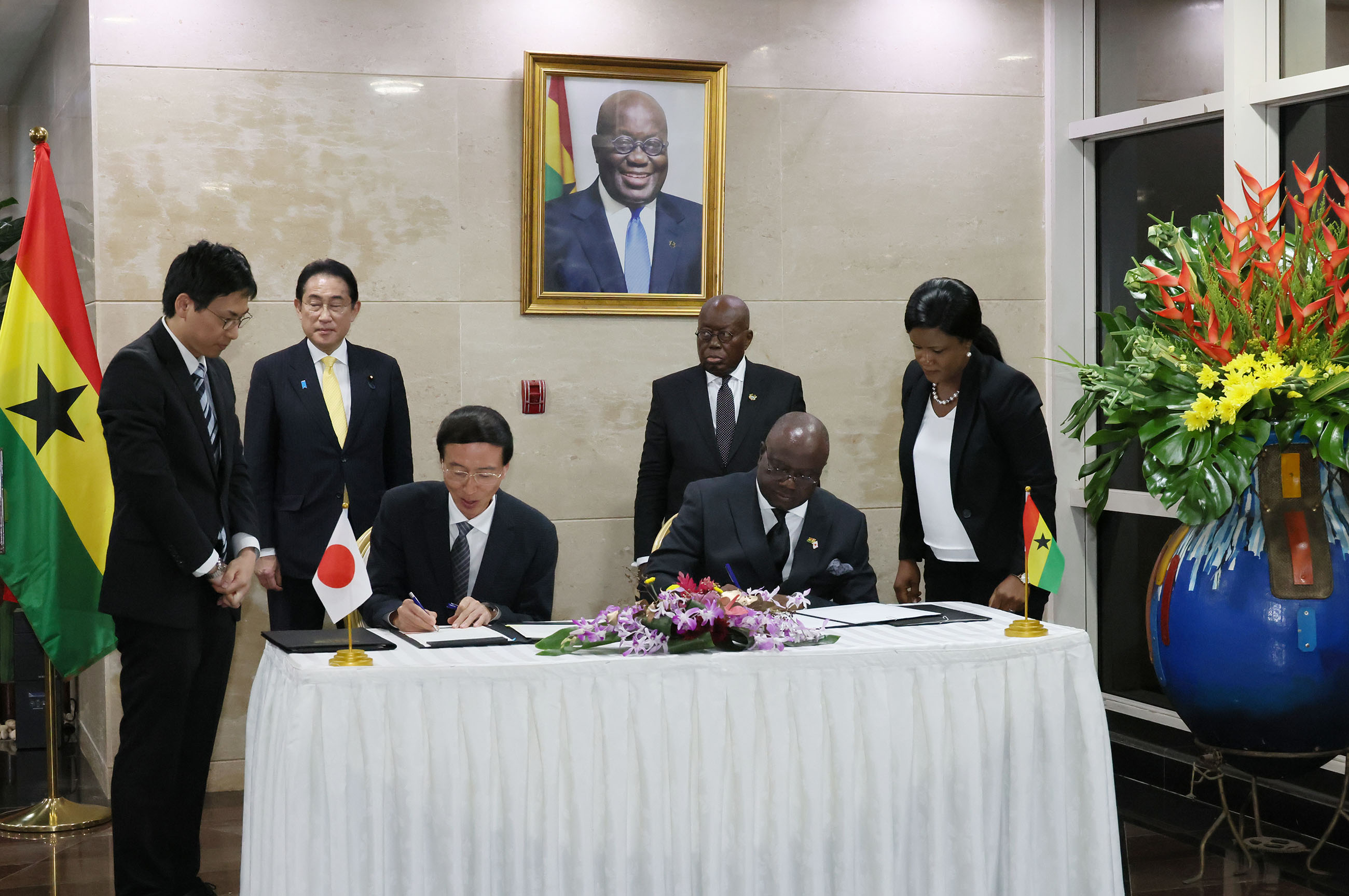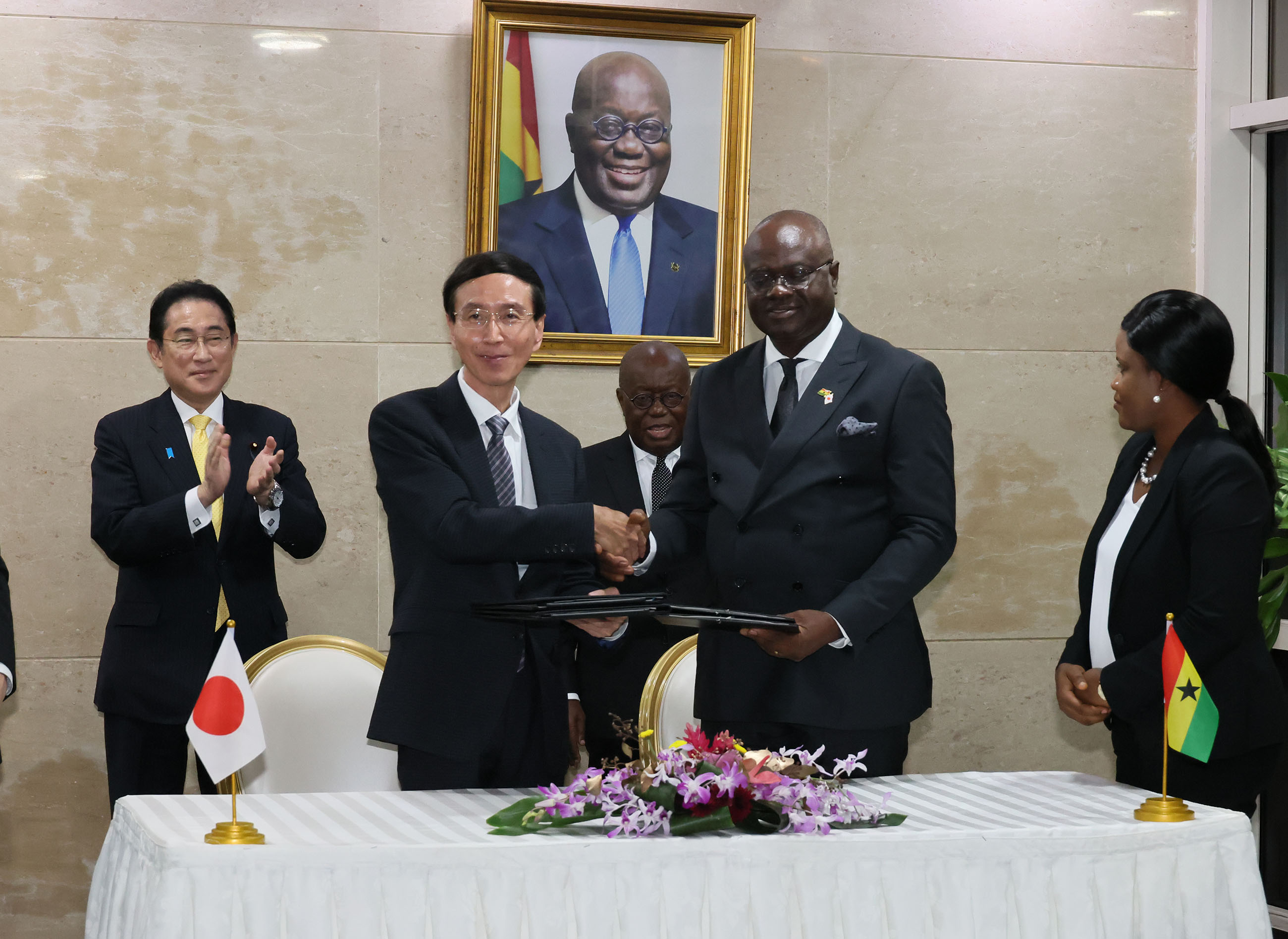Exchange of Notes concerning Grant Aid to the Republic of Ghana (Summary)
May 1, 2023
[Provisional translation]
On May 1 local time (May 2 JST), H.E. Mr. MOCHIZUKI Hisanobu, Ambassador Extraordinary and Plenipotentiary of Japan to the Republic of Ghana, and Hon. Mr. Kwaku Ampratwum-Sarpong, Deputy Minister for Foreign Affairs and Regional Integration of the Republic of Ghana exchanged notes concerning two grant aid projects totaling 766 million yen, in Accra, capital of the Republic of Ghana, in the presence of H.E. Mr. KISHIDA Fumio, Prime Minister of Japan, and H.E. Mr. Nana Addo Dankwa Akufo-Addo, President of the Republic of Ghana.The overview of the projects is as follows.
1. The Project for the Enhancement of Rice Seeds Production Capacity (granted up to 471 million yen)
In recent years, rice consumption has continued to increase in Ghana, with its annual consumption reaching approximately one million tons in 2017 and rice is the country's second staple food after maize. Despite the increasing demand for domestically produced rice, its annual production is currently limited to approximately 400,000 tons which leads the country to heavily depend on imported rice. In addition, inadequate removal of impurities and a large amount of crushed rice have been pointed out as a major issue and quality improvement of domestically produced rice cannot be ignored so that it can compete with imported rice.
This cooperation aims to increase the production volume and improve the quality of certified seeds by improving equipment necessary for seed production in four irrigation districts under the Ghana Irrigation Development Authority, thereby contributing to enhancing the country's industrial base, including agriculture.
2. The Project for Human Resource Development Scholarship (granted up to 295 million yen)
Ghana faces the greatest challenge to improve its administrative capacity and institution building. This cooperation aims to solve development issues in Ghana by providing support for young administrative officials who are expected to play an active role in the core of the Ghanaian Government by encouraging them to obtain master's or doctoral degrees at graduate schools in Japan. This cooperation is also prepared to contribute to enhancement of bilateral relations by establishing people-to-people networks.
3. At the 8th Tokyo International Conference on African Development (TICAD 8), held in August 2022, Japan announced plans to train 4,600 individuals to address the food crisis and support sustainable agricultural production in Africa, as well as to build institutions and strengthen governance in the judicial and administrative sectors. These cooperative activities will materialize this commitment.
1. The Project for the Enhancement of Rice Seeds Production Capacity (granted up to 471 million yen)
In recent years, rice consumption has continued to increase in Ghana, with its annual consumption reaching approximately one million tons in 2017 and rice is the country's second staple food after maize. Despite the increasing demand for domestically produced rice, its annual production is currently limited to approximately 400,000 tons which leads the country to heavily depend on imported rice. In addition, inadequate removal of impurities and a large amount of crushed rice have been pointed out as a major issue and quality improvement of domestically produced rice cannot be ignored so that it can compete with imported rice.
This cooperation aims to increase the production volume and improve the quality of certified seeds by improving equipment necessary for seed production in four irrigation districts under the Ghana Irrigation Development Authority, thereby contributing to enhancing the country's industrial base, including agriculture.
2. The Project for Human Resource Development Scholarship (granted up to 295 million yen)
Ghana faces the greatest challenge to improve its administrative capacity and institution building. This cooperation aims to solve development issues in Ghana by providing support for young administrative officials who are expected to play an active role in the core of the Ghanaian Government by encouraging them to obtain master's or doctoral degrees at graduate schools in Japan. This cooperation is also prepared to contribute to enhancement of bilateral relations by establishing people-to-people networks.
3. At the 8th Tokyo International Conference on African Development (TICAD 8), held in August 2022, Japan announced plans to train 4,600 individuals to address the food crisis and support sustainable agricultural production in Africa, as well as to build institutions and strengthen governance in the judicial and administrative sectors. These cooperative activities will materialize this commitment.
[Reference]
Ghana has an area of approximately 239,000 square kilometers (roughly two-thirds the area of Japan), a population of 31.73 million (World Bank, 2021), and a per capita gross national income (GNI) of 2,360 U.S. dollars (World Bank, 2021).

